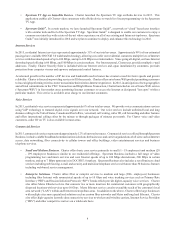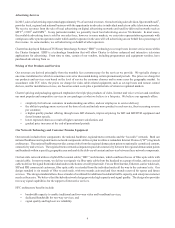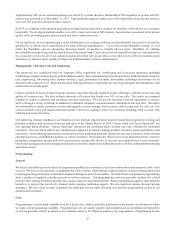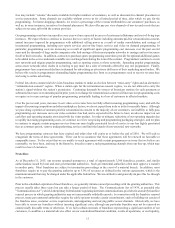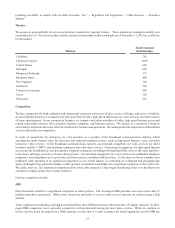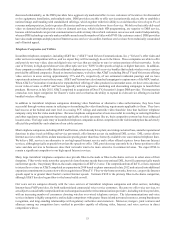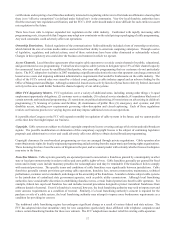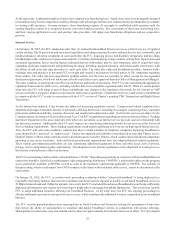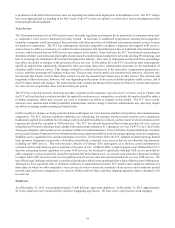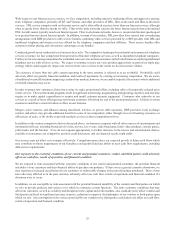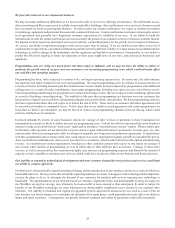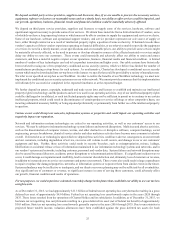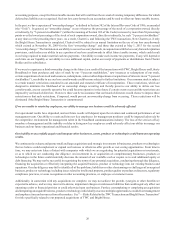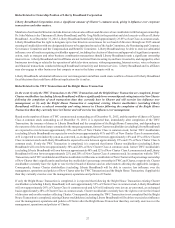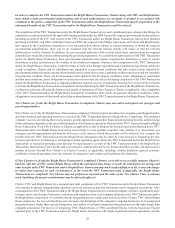Charter 2015 Annual Report Download - page 33
Download and view the complete annual report
Please find page 33 of the 2015 Charter annual report below. You can navigate through the pages in the report by either clicking on the pages listed below, or by using the keyword search tool below to find specific information within the annual report.18
At the same time, a substantial number of states have adopted new franchising laws. Again, these laws were principally designed
to streamline entry for new competitors, and they often provide advantages for these new entrants that are not immediately available
to existing cable operators. In many instances, these franchising regimes do not apply to established cable operators until the
existing franchise expires or a competitor directly enters the franchise territory. The exact nature of these state franchising laws,
and their varying application to new and existing video providers, will impact our franchising obligations and our competitive
position.
Internet Service
On February 26, 2015, the FCC adopted an order that: (1) reclassified broadband Internet service as a Title II service, (2) applied
certain existing Title II provisions and associated regulations (including requiring that rates and practices be just, reasonable, and
nondiscriminatory, allowing complaints in court and before the FCC, imposing privacy and disability obligations, and providing
broadband providers with access to poles and conduits), (3) forbore from applying a range of other existing Title II provisions and
associated regulations, but to varying degrees indicated that this forbearance may be only temporary, and (4) issued new rules
expanding disclosure requirements and prohibiting blocking, throttling, paid prioritization, and unreasonable interference with
the ability of end users and edge providers to reach each other. The order also subjected broadband providers’ Internet traffic
exchange rates and practices to potential FCC oversight and created a mechanism for third parties to file complaints regarding
these matters. The order has been appealed by multiple parties, but the rules are currently in effect (except for the expanded
disclosure requirements, which will not become effective until they receive approval from the Office of Management and Budget).
The order could have a material adverse effect on our business and results of operations. The FCC is also considering the appropriate
regulatory framework for VoIP service, including whether that service should be regulated under Title II. While we cannot predict
what rules the FCC will adopt as part of these rulemakings, any changes to the regulatory framework for our Internet or VoIP
services could have a negative impact on our business and results of operations. Charter has, however, made certain commitments
to comply with the FCC’s order in connection with the FCC’s review of Charter’s pending TWC Transaction and Bright House
Transaction.
As the Internet has matured, it has become the subject of increasing regulatory interest. Congress and federal regulators have
adopted a wide range of measures directly or potentially affecting Internet use, including, for example, consumer privacy, copyright
protections, defamation liability, taxation, obscenity, and unsolicited commercial e-mail. Our Internet services are subject to the
Communications Assistance for Law Enforcement Act (“CALEA”) requirements regarding law enforcement surveillance. Pending
and future legislation in this area could adversely affect our operations as an Internet service provider and our relationship with
our Internet customers. Additionally, the FCC and Congress are considering subjecting Internet access services to the Universal
Service funding requirements. These funding requirements could impose significant new costs on our high-speed Internet service.
Also, the FCC and some state regulatory commissions direct certain subsidies to telephone companies deploying broadband to
areas deemed to be “unserved” or “underserved.” Charter has opposed such subsidies when directed to areas that Charter serves.
Despite Charter’s efforts, future subsidies may be directed to areas served by Charter, which could result in subsidized competitors
operating in our service territories. State and local governmental organizations have also adopted Internet-related regulations.
These various governmental jurisdictions are also considering additional regulations in these and other areas, such as privacy,
pricing, service and product quality, and taxation. The adoption of new Internet regulations or the adaptation of existing laws to
the Internet could adversely affect our business.
The FCC is considering whether online video distributors (“OVDs”) that offer programming to customers with a broadband Internet
connection should be classified as multichannel video programming distributors (“MVPDs”), and thereby subject to the program
access protections available to MVPDs, as well as some of the regulatory requirements applicable to MVPDs. The outcome of
this proceeding, which could impact how OVDs compete in the future with traditional cable service, cannot be determined at the
current time.
On January 29, 2015, the FCC, in a nation-wide proceeding evaluating whether “advanced broadband” is being deployed in a
reasonable and timely fashion, increased the minimum connection speeds required to qualify as advanced broadband service to
25 Mbps for downloads and 3 Mbps for uploads. As a result, the FCC concluded that advanced broadband was not being sufficiently
deployed and initiated a new inquiry into what steps it might take to encourage broadband deployment. This action may lead the
FCC to adopt additional measures affecting our broadband business. At the same time, the FCC has ongoing proceedings to
allocate additional spectrum for advanced wireless service, which could provide additional wireless competition to our broadband
business.
The FCC recently granted petitions from municipalities in North Carolina and Tennessee seeking the preemption of state laws
that restrict the ability of municipalities to construct and deploy broadband systems in competition with private offerings.
Municipalities in other states may seek similar relief as there are approximately 20 such state laws now in effect. FCC preemption


